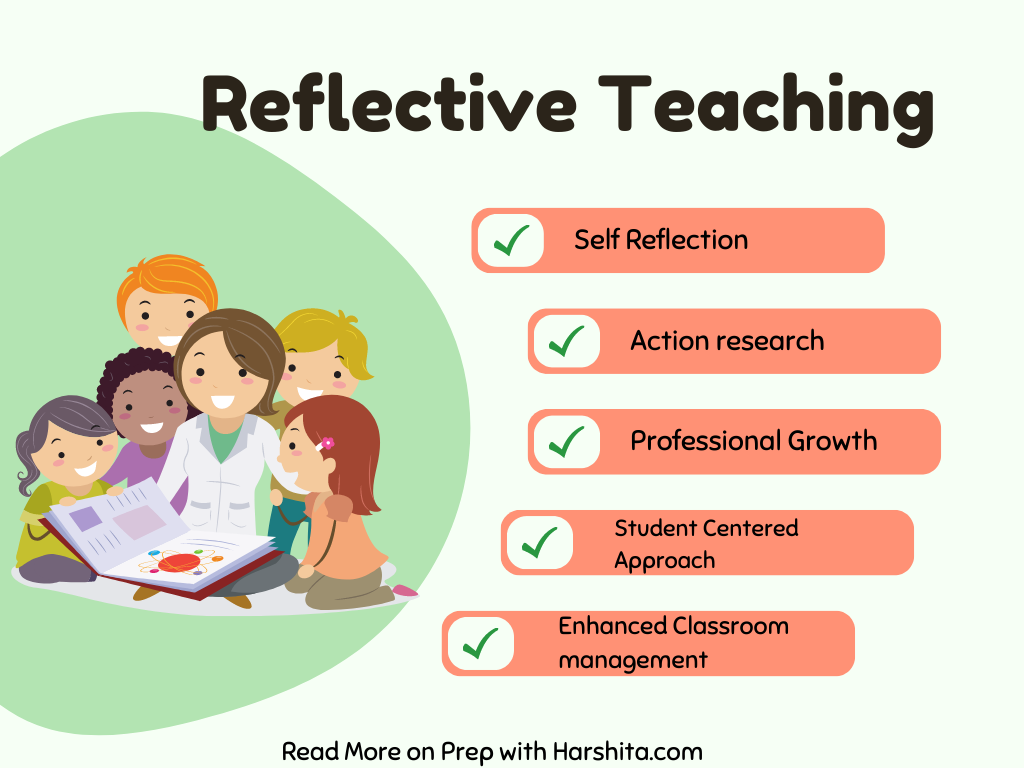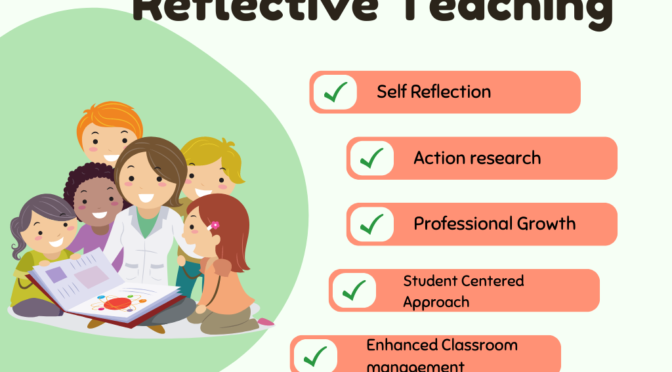Reflective teaching is an approach that involves self-examination, critical analysis, and thoughtful evaluation of one’s teaching practices and their impact on student learning. It encourages educators to engage in a continuous cycle of reflection, action, and improvement to enhance their teaching effectiveness.
Here are the key aspects and benefits of reflective teaching:
- Self-Reflection: Reflective teaching starts with introspection and self-reflection. Educators examine their beliefs, values, teaching strategies, and instructional decisions. They reflect on their goals, instructional practices, and classroom dynamics to gain insight into their strengths, areas for improvement, and the impact on student learning.
- Action Research: Reflective teaching often involves conducting action research to investigate specific aspects of teaching and learning. Educators collect data, analyze it, and make informed decisions based on the findings. Action research allows teachers to make evidence-based adjustments to their instructional strategies and interventions.
- Professional Growth: Reflective teaching supports continuous professional growth. By critically examining their teaching practices, educators identify areas where they can develop new skills, explore innovative approaches, and incorporate research-based strategies into their instruction. It encourages a commitment to lifelong learning and ongoing improvement.
- Student-Centered Approach: Reflective teaching places a strong emphasis on student learning and outcomes. Educators consider how their teaching practices impact student engagement, understanding, and achievement. They assess whether their instructional methods effectively address the diverse needs, learning styles, and abilities of their students.
- Improved Instructional Decision-Making: It helps teachers make informed instructional decisions. Through reflection, educators evaluate the effectiveness of their teaching strategies, learning materials, and assessments. They adjust their instruction based on the feedback received from students, assessment results, and ongoing observations to better meet student needs.
- Enhanced Classroom Management: It involves analyzing classroom management practices and strategies. Educators consider the impact of their behavior management techniques, rules, routines, and classroom environment on student behavior and engagement. They make necessary adjustments to promote a positive and inclusive learning environment.
- Collaboration and Peer Feedback: It encourages collaboration and the sharing of experiences with colleagues. Educators can engage in professional learning communities, peer observations, and collaborative discussions to gain different perspectives, exchange ideas, and receive constructive feedback. This collaboration supports professional growth and expands instructional knowledge and practices.
- Student Reflection: Reflective teaching also involves encouraging students to reflect on their own learning. Educators incorporate reflection activities and strategies that help students evaluate their progress, strengths, and areas for growth. Student reflection fosters metacognitive skills, self-assessment, and a sense of ownership over learning.
- Culturally Responsive Teaching: Reflective teaching prompts educators to examine their cultural assumptions, biases, and practices. They reflect on how their teaching respects and values the diverse cultural backgrounds, experiences, and identities of their students. By embracing culturally responsive teaching practices, educators create inclusive learning environments that affirm and engage all learners.
Reflective teaching is a continuous process that requires time for contemplation, self-assessment, and thoughtful planning. It encourages educators to embrace a growth mindset, engage in professional development, and seek feedback from students, colleagues, and administrators. By engaging in reflective teaching practices, educators can continually refine their instructional approaches, improve student outcomes, and create meaningful learning experiences for their students.
Also Read : Cooperative Learning

Also Visit : Prep with Harshita

